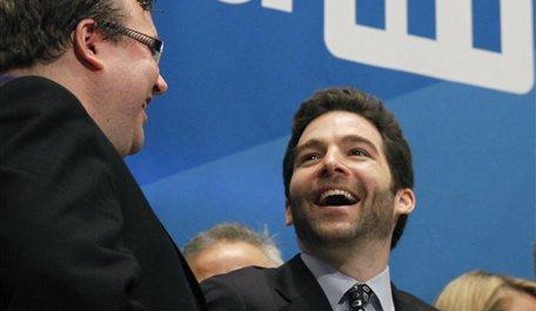Remember when Barack Obama tried to explain why his lack of experience didn’t really matter? He told rapturous audiences that his superior judgment mattered more than Hillary Clinton’s long years inside the Beltway. Obama claimed that his terrific hindsight qualified him for the presidency much more than John McCain’s 26 years in Congress.
However, now that people have begun to take a closer look at his judgment, especially in his political associations and in his judgment about middle America, Obama has taken to calling that a “distraction”. Charles Krauthammer replies that Obama had better remember the nature of the office for which he’s running:
With that, Obama identified the new public enemy: the “distractions” foisted upon a pliable electorate by the malevolent forces of the status quo, i.e., those who might wish to see someone else become president next January. “It’s easy to get caught up in the distractions and the silliness and the tit for tat that consumes our politics” and “trivializes the profound issues” that face our country, he warned sternly. These must be resisted.
Why? Because Obama understands that the real threat to his candidacy is less Hillary Clinton and John McCain than his own character and cultural attitudes. He came out of nowhere with his autobiography already written, then saw it embellished daily by the hagiographic coverage and kid-gloves questioning of a supine press. (Which is why those “Saturday Night Live” parodies were so devastatingly effective.)
Then came the three amigos: Tony Rezko, the indicted fixer; Jeremiah Wright, the racist reverend; William Ayers, the unrepentant terrorist. And then Obama’s own anthropological observation that “bitter” working-class whites cling to guns and religion because they misapprehend their real class interests.
In the now-famous Pennsylvania debate, Obama had extreme difficulty answering questions about these associations and attitudes. The difficulty is understandable. Some of the contradictions are inexplicable. How does one explain campaigning throughout 2007 on a platform of transcending racial divisions, while in that same year contributing $26,000 to a church whose pastor incites race hatred?
What is Obama to do? Dismiss all such questions about his associations and attitudes as “distractions.” And then count on his acolytes in the media to wage jihad against those who have the temerity to raise these questions. As if the character and beliefs of a man who would be president are less important than the “issues.” As if some political indecency was committed when Obama was prevented from going through his latest — 21st and likely last — primary debate without being asked about Wright or Ayers or the tribal habits of gun-toting, God-loving Pennsylvanians.
Remember that one of the campaign slogans for Obama was “Judgment to Lead”. I often use the picture of Obama with that slogan on the lectern just to emphasize that Obama himself opened the debate over his judgment. Now that people want to start asking about the judgment he claims as his superior quality for the election, he wants to label it a “distraction”, but without it he has nothing else to offer except three undistinguished years as a backbencher in the Senate.
With no track record of legislative accomplishments and no evidence of any real engagement in change, judgment would have eventually become a focal issue for Obama anyway, even if he hadn’t brought it up himself. That means his judgment in launching his political career at the home of an unrepentant terrorist like William Ayers becomes relevant and germane, especially since the political connections between the two continued after Ayers announced that he wished he’d gone further in his political violence. Even in 2007, Ayers and Bernadine Dohrn talk about overthrowing the “corporate government” of the United States, to replace it with something more akin to Red China.
What is Obama’s judgment on Ayers and Dohrn? They’re “respectable figures of the mainstream in Chicago.”
For that matter, what is Obama’s judgment on middle America? In what he thought was a friendly crowd among the hard-Left elite in San Francisco, Obama judged small-town voters as bitter xenophobes that “cling” to guns and religion only because — and this is particularly revealing — “government failed them”. His solution was to provide an even bigger dose of government intervention in order to get them to see the Utopia that would follow. That was the point of that speech on Billionaires Row, which later got termed “Crackerquiddick”.
For someone to see Ayers, Dohrn, and Jeremiah Wright as mainstream, they have to be very far out of what the rest of the country sees as normal political thought. Distraction? Obama’s judgment is a revelation.
Update: Via Hugh Hewitt, here’s Bernadine Dohrn speaking at the 40th anniversary of the SDS, talking about “overthrowing” the American government — in 2007:
Barack Obama thinks this is mainstream.
Update II: Stuart Taylor, a self-described admirer of Barack Obama, writes at the National Journal that questions of judgment and character are not “distractions”, but central to the decision voters must make. Scolding journalists who shrieked at the April 16th ABC debate and the questions asked by George Stephanopolous and Charles Gibson, Taylor says the issues raised in the first half of the debate hardly qualify as “gossip”, but go to these paramount considerations:
Burke and Madison might well have approved the judgment-focused questions that pro-Obama journalists have so furiously excoriated moderators Charles Gibson and George Stephanopoulos, of ABC News, for asking at the April 16 debate between Barack Obama and Hillary Rodham Clinton. The Washington Post’s Tom Shales accused the two of “shoddy, despicable performances.” The New Yorker’s Hendrik Hertzberg said that they had committed “something akin to a federal crime.” The New York Times’s David Carr called it a “disgusting spectacle.”
Such commentators were especially livid that for much of the first half of the two-hour debate the moderators bored in on Obama’s gaffe about “bitter” laid-off small-towners who “cling to guns or religion or antipathy to people who aren’t like them”; questioned his closeness to the Rev. Jeremiah Wright through many years of Wright’s anti-American, white-bashing rants; and brought up his more glancing connection to William Ayers, a University of Illinois professor who was a Weather Underground leader and (by his own admission) bomber almost 40 years ago.
Many who have been disposed to admire Obama, including me, see these matters as raising troublesome questions about his judgment and character. Many of us have come to wonder whether the purportedly post-ideological Obama is so close to his party’s business-bashing, pacifistic left wing as to skew his judgment on matters ranging from the capital-gains tax to Iraq. Perhaps our suspicions are mistaken. But Obama has hardly laid them to rest.
To passionate Obama devotees, however, questions about Jeremiah Wright, Bill Ayers, and the like are “specious and gossipy trivia,” in Shales’s words. They wanted Gibson and Stephanopoulos—who also asked about Iran, Iraq, affirmative action, guns, and taxes (not to mention Hillary Clinton’s fantasies about coming under sniper fire in Bosnia)—to spend the entire time on policy issues.








Join the conversation as a VIP Member